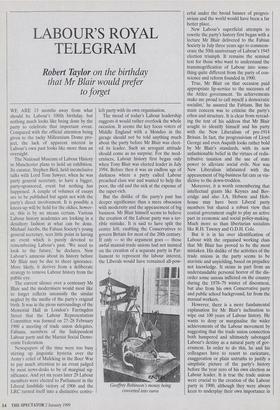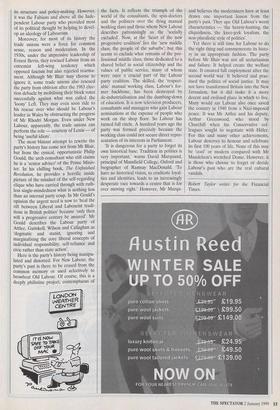LABOUR'S ROYAL TELEGRAM
Robert Taylor on the birthday
that Mr Blair would prefer to forget
WE ARE 13 months away from what should be Labour's 100th birthday, but nothing much looks like being done by the party to celebrate that important event. Compared with the official attention being given to the tacky Millennium Dome pro- ject, the lack of apparent interest in Labour's own past looks like more than an oversight.
The National Museum of Labour History in Manchester plans to hold an exhibition. Its curator, Stephen Bird, held inconclusive talks with Lord Tom Sawyer, when he was party general secretary, to have a bigger, party-sponsored, event but nothing has happened. A couple of volumes of essays are to be published but again not with the party's direct involvement. It is possible a knees-up will be held for the oldies, howev- er, this is by no means certain. Various Labour history academics are looking in a desultory fashion at what can be done. Michael Jacobs, the Fabian Society's young general secretary, sees little point in having an event which is purely devoted to remembering Labour's past. 'We need to look to the future,' he declares. New Labour's amnesia about its history before Mr Blair may be due to sheer ignorance. More likely, it derives from a deliberate strategy to remove Labour history from the public eye.
The current silence over a centenary Mr Blair and the modernisers would most like to forget reflects uncannily the similar neglect by the media of the party's original birth. It was in the pious surroundings of the Memorial Hall in London's Farringdon Street that the Labour Representation Committee was formed on 27-28 February 1900 a meeting of trade union delegates, Fabians, members of the Independent Labour party and the Marxist Social Demo- cratic Federation.
Newspapers of the time were too busy stirring up jingoistic hysteria over the Army's relief of Mafeking in the Boer War to pay much attention to an event judged by most news-desks to be of marginal sig- nificance. And yet six years later 29 Labour members were elected to Parliament in the Liberal landslide victory of 1906 and the LRC turned itself into a distinctive centre- left party with its own organisation.
The mood of today's Labour leadership suggests it would rather overlook the whole occasion. It seems the key focus voters of Middle England with a Mondeo in the garage should not be told anything much about the party before Mr Blair was elect- ed its leader. Such an arrogant attitude should come as no surprise. For the mod- ernisers, Labour history first began only when Tony Blair was elected leader in July 1994. Before then it was an endless age of darkness where a party called Labour preached class war and wanted to help the poor, the old and the sick at the expense of the super-rich.
But the dislike of the party's past has deeper significance than a mere obsession with modernity and the appeasement of big business. Mr Blair himself seems to believe the creation of the Labour party was a ter- rible mistake. It is said to have split the centre left, enabling the Conservatives to govern Britain for most of the 20th century. If only — so the argument goes — those awful manual-trade unions had not insisted on the creation of a separate party in Par- liament to represent the labour interest, the Liberals would have remained all-pow- Geoffrey Robinson's money being converted into euros erful under the broad banner of progres- sivism and the world would have been a far better place.
New Labour's superficial attempts to rewrite the party's history first began with a lecture Mr Blair delivered to the Fabian Society in July three years ago to commem- orate the 50th anniversary of Labour's 1945 election triumph. It remains the seminal text for those who want to understand the transmogrification of Labour into some- thing quite different from the party of con- science and reform founded in 1900.
True, Mr Blair on that occasion paid appropriate lip-service to the successes of the Attlee government. 'Its achievements make me proud to call myself a democratic socialist,' he assured the Fabians. But his main concern was to criticise the party's ethos and structure. It is clear from reread- ing the text of his address that Mr Blair sought to identify himself and his party with the New Liberalism of pre-1914 Britain. In fact, the progressivism of Lloyd George and even Asquith looks rather bold by Mr Blair's standards, with its now unfashionable belief in the virtues of redis- tributive taxation and the use of state power to alleviate social evils. Nor was New Liberalism infatuated with the appeasement of big-business fat cats or vin- dictive to the down-trodden.
Moreover, it is worth remembering that intellectual giants like Keynes and Bev- eridge and also J.A. Hobson and Hob- house may have been Liberal party members but shared a robust view that central government ought to play an active part in economic and social policy-making. Much more so than libertarian socialists like R.H. Tawney and G.D.H. Cole.
But it is in his over identification of Labour with the organised working class that Mr Blair has proved to be the most mistaken. His dislike of the activities of the trade unions in the party seems to be atavistic and unyielding, based on prejudice not knowledge. It stems in part from an understandable personal horror of the dis- order some unions inflicted on the country during the 1978-79 winter of discontent, but also from his own Conservative party and public school background, far from the manual workers.
However, there is a more fundamental explanation for Mr Blair's inclination to wipe out 100 years of Labour history. He wants to deny or marginalise the wider achievements of the Labour movement by suggesting that the trade union connection both hampered and ultimately sabotaged Labour's destiny as a natural party of gov- ernment. In order to do this, he and his colleagues have to resort to caricature, exaggeration or plain untruths to justify a simplistic picture of the party's history before the year zero of his own election as Labour leader. It is true the trade unions were crucial to the creation of the Labour party in 1900, although they were always keen to underplay their own importance in its structure and policy-making. However, it was the Fabians and above all the Inde- pendent Labour party who provided most of its political thought by helping to devel- op an ideology of Labourism. Moreover, for most of its history the trade unions were a force for common sense, reason and moderation. In the 1930s, under the impressive leadership of Ernest Bevin, they rescued Labour from an extremist left-wing tendency which opposed fascism but also rejected rearma- ment. Although Mr Blair may choose to ignore it, some trade unions also rescued the party from oblivion after the 1983 elec- tion debacle by mobilising their block votes successfully against what was called the `loony' Left. They may even soon ride to his rescue over who should be Labour's leader in Wales by obstructing the progress of Mr Rhodri Morgan. Even under New Labour, apparently, the trade unions can perform the role — courtesy of Lenin — of being 'useful idiots'. The most blatant attempt to rewrite the party's history has come not from Mr Blair, but from the cynical, opportunistic Philip Gould, the arch-consultant who still claims he is a 'senior adviser' of the Prime Minis- ter. In his chilling book, The Unfinished Revolution, he provides a horrific inside picture of the mindset of the self-regarding clique who have carried through with ruth- less single-mindedness what is nothing less than an internal party coup. In Mr Gould's opinion the urgent need is now to 'heal the rift between Liberal and Labourist tradi- tions in British politics' because 'only then will a progressive century be assured'. Mr Gould describes the Labour party of Attlee, Gaitskell, Wilson and Callaghan as `dogmatic and statist, ignoring and marginalising the core liberal concepts of individual responsibility, self-reliance and civic rather than state action'.
Here is the party's history being manipu- lated and distorted. For New Labour, the party's past is there to be erased from the common memory or used selectively to browbeat Old Labour. Of course, this is a deeply philistine project, contemptuous of the facts. It reflects the triumph of the world of the consultants, the spin-doctors and the pollsters over the dying manual working class and those whom New Labour describes patronisingly as the 'socially excluded'. Now, at the 'heart of the new progressive coalition' lies the 'new middle class, the people of the suburbs'; but this seems to exclude what remains of the pro- fessional middle class, those dedicated to a shared belief in social citizenship and the values of public service, many of whom were once a crucial part of the Labour party coalition. The skilled, the 'respect- able' manual working class, Labour's for- mer backbone, has been destroyed by de-industrialisation and the dumbing-down of education. It is now television producers, consultants and managers who gain Labour nominations at the expense of people who work on the shop floor. So Labour has turned full circle. A hundred years ago the party was formed precisely because the working class could not secure direct repre- sentation of its interests in Parliament.
`It is dangerous for a party to forget its own historical base. Tradition in politics is very important,' warns David Marquand, principal of Mansfield College, Oxford and biographer of Ramsay MacDonald. `To have no historical vision, to eradicate loyal- ties and identities, leads to an increasingly desperate race towards a centre that is for ever moving right.' However, Mr Marqu- and believes the modernisers have at least drawn one important lesson from the party's past. They ape Old Labour's worst characteristics — 'the heresy-hunting, the cliquishness, the knee-jerk loyalism, the non-pluralistic style of politics'.
Yet there is still time for Labour to do the right thing and commemorate its histo- ry in an appropriate fashion. The party before Mr Blair was not all sectarianism and failure. It helped create the welfare state. It ensured full employment after the second world war. It believed and prac- tised the politics of social justice. It may not have transformed Britain into the New Jerusalem, but it did make it a more decent and civilised place in which to live. Many would say Labour also once saved the country in 1940 from a Nazi-imposed peace. It was Mr Attlee and his deputy, Arthur Greenwood, who stood by Churchill when his Conservative col- leagues sought to negotiate with Hitler. For this and many other achievements, Labour deserves to honour and celebrate its first 100 years of life. None of this may be 'cool' or modern compared with Mr Mandelson's wretched Dome. However, it is those who choose to forget or deride Labour's past who are the real cultural vandals.
Robert Taylor writes for the Financial Times.



























































 Previous page
Previous page